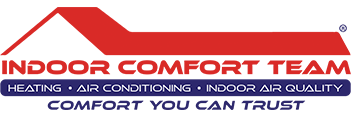Selecting the right furnace filter is essential for maintaining your home’s air quality and keeping your HVAC system running efficiently. With so many options available, it can be difficult to know which filter is best for your needs.
Since 1979, Indoor Comfort Team has been the trusted HVAC professional on both sides of the river in St. Louis, helping homeowners make informed decisions about their heating and cooling systems. In this blog, we’ll break down the key factors to consider when choosing the perfect furnace filter for your home.

Let’s look at how to pick a furnace filter and why it’s important.
1. Choose the Right Filter Size
One of the most important factors to consider when choosing a furnace filter is size. Filters are generally measured by length, width, and depth (or thickness), which allow them to fit snugly into the furnace’s filter slot without being too tight or loose.
The easiest way to determine what size filter you need is to look at the old one. The size should be printed on the filter frame. Alternatively, you can measure the filter yourself, check for the recommended filter dimensions in the furnace’s owner manual, or contact the manufacturer for assistance.

The most common furnace filter sizes include 14 in x 25 in, 16 in x 20 in, 16 in x 25 in, 20 in x 25 in, and 25 in x 25 in. If you’re unable to determine the appropriate size filter for your equipment, contact an HVAC specialist for help. At Indoor Comfort Team, our VIP Club Plan makes it easy to keep up with air filter cleanings and replacements. Receive free filters twice a year, a 12-point tune-up twice a year, and many other VIP preventative services.
2. Select an Appropriate MERV Rating
A minimum efficiency reporting value (MERV) rating determines the effectiveness of an air filter. The higher the MERV rating, the better equipped the filter is at trapping tiny particles in the air. Filter MERV ratings range from 1 to 20, with 1 being the least efficient and 20 being the most efficient.
While selecting a filter with a high MERV rating may seem like the best option, other aspects may influence your decision. For example, filters with high MERV ratings tend to have high densities, which will capture more particles from the air. This is great for your air quality but leads to the filter needing to be replaced more often, which can lead to increased costs.

When determining an appropriate MERV rating for your particular heating system, take time to check your system specifications. Most residential HVAC systems work best with filters that have a MERV rating between 8 and 13. Ultimately, the judgment call is yours, depending factors in your home and your preference for replacement schedule.
3. Compare Filter Types
When shopping for furnace filters, you’ll likely come across a variety of options. The type of filter you choose will play a direct role in its effectiveness. Some of the most common types of furnace filters include:
- Fiberglass Air Filters: Fiberglass filters are the most affordable option. However, they also have the lowest MERV rating, with a typical rating between 1 and 4. If having high air quality is a priority, fiberglass air filters may not be the best option for your home. They are better suited for homeowners who value energy efficiency and want to place the least restrictions on airflow.
- Washable Air Filters: As the name suggests, a washable filter can be cleaned and reused. Unlike a fiberglass filter that should be replaced monthly, washable air filters only need to be replaced every few years.
- Electrostatic Air Filters: When it comes to electrostatic air filters, homeowners have the option of both disposable and reusable options. The charged fibers in these filters work to effectively capture both small and large particles in the air. The larger surface area helps to capture more particles.

Another important decision you’ll need to make when comparing filter types is pleated or non-pleated. Pleated air filters tend to be the most efficient and typically last longer than their non-pleated counterparts. This is because pleated filters contain considerably more surface area which can trap pollutants and contaminants without disturbing air flow. Pleated filters are best suited for systems that require moderate to high MERV ratings.
As proud Trane Comfort Specialists with an A+ BBB Rating, you can trust the HVAC experts at Indoor Comfort Team to help you determine the best type of air filter for your particular system and air quality needs.
4. Consider the Level of Maintenance
While no air filter lasts forever, the type of filter you choose will influence the level of maintenance you’ll encounter when caring for your heating system. Reusable filters require more maintenance than disposable filters that you simply throw away and replace.
While reusable filters do reduce waste, they must be regularly cleaned to remove dirt and dust buildup that can restrict airflow. Washable filters are generally constructed of a heavy aluminum frame with fibers that must be cleaned and completely dried before reinstalling. Cleaning these filters usually means rinsing them off in the shower or with a garden hose.

At Indoor Comfort Team, we know that maintaining your heating and cooling equipment can be costly. That is why we great financing and money-saving promotions for the repairs or installation work that your home needs to remain healthy and comfortable.
5. Take Into Account Air Quality Needs
When it comes to air quality needs, not all homes are made equal. For example, a home with occupants with asthma or other respiratory conditions will generally need better air quality than a home with relatively healthy occupants. However, just because you may be healthy doesn’t mean you should overlook the importance of good air quality.
The air quality in your home can greatly influence your long-term health. Most people can benefit from filters made of denser materials, such as polyester, which help block more airborne particles and offer ample filtration. Electrostatic air filters, which use electricity to attract and trap particles, can also be efficient at maintaining optimal air quality in a home.
If your home contains allergy sufferers, look for filters with a higher MERV rating, generally between 8 and 13, to effectively capture pet dander and pollen. Those with asthma may want to consider a HEPA filter, which is capable of trapping particles as small as 0.3 microns.

Schedule Service with Indoor Comfort Team
Choosing the right furnace filter is a small but important step in ensuring your home’s comfort and air quality. By selecting the proper filter and replacing it regularly, you’ll help extend the life of your HVAC system and improve the air you and your family breathe.
If you have any questions or need help choosing the right filter, Indoor Comfort Team is here to assist. As the trusted HVAC experts in St. Louis since 1979, we’re dedicated to keeping your system running efficiently and your home comfortable. Contact us today at (314)230-9542 for expert advice or any of your heating and cooling needs.





